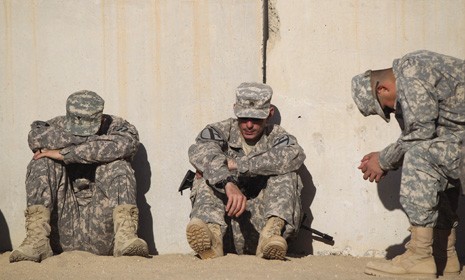The Iraq War's 'bittersweet' end: 4 lingering questions
The last U.S. troops drove out of Iraq on Sunday, effectively ending the war. But the battle over the controversial conflict's legacy is only beginning

A free daily email with the biggest news stories of the day – and the best features from TheWeek.com
You are now subscribed
Your newsletter sign-up was successful
"That's it, the war is over," a jubilant U.S. soldier told NBC News' Richard Engel as the last U.S. troops quietly crossed the Iraq border into Kuwait on Sunday. The last 500 soldiers whooped and cheered when they exited Iraq, but with 4,483 U.S. troops killed in the nearly nine-year war, the end is "bittersweet" for many of those who fought in it. And the U.S. is leaving behind more than vehicles, equipment, and a massive embassy with some 16,000 State Department personnel and military contractors. We're also leaving several unanswered questions. Here are four of the biggest:
1. Did we win?
"In military terms, yes," we won, says Andy Kravetz in the Peoria Journal Star. After the 2006 surge, U.S. troops have kept Iraq largely under control. But it's more complicated than all that, so "in reality, who knows"? We do, says the San Francisco Chronicle in an editorial. It's no victory to leave behind "a country devastated by American efforts to reshape it." And our "arrogant foreign intrusion" has indelibly damaged our influence in the crucial region. That's why at the "almost perfunctory ceremony" to mark the war's end, "no one even tried to use the word 'victory'," says Doyle McManus in the Los Angeles Times. Let's just say "Mission Partly Accomplished."
The Week
Escape your echo chamber. Get the facts behind the news, plus analysis from multiple perspectives.

Sign up for The Week's Free Newsletters
From our morning news briefing to a weekly Good News Newsletter, get the best of The Week delivered directly to your inbox.
From our morning news briefing to a weekly Good News Newsletter, get the best of The Week delivered directly to your inbox.
2. Will Iraq hold together?
Violence in Iraq is at the lowest level since before the 2003 invasion, but the country still faces potentially explosive divisions between Sunnis, Shiites, and Kurds — sectarian strife many Iraqis say didn't exist before the U.S. invaded. "We are glad to see the last U.S. soldier leaving the country," Baghdad merchant Said Hassan tells the Associated Press. But "the Americans have left behind them a country that is falling apart." On the plus side, says Fred Kaplan at Slate, the U.S. fostered "a functioning Iraqi government... for resolving these problems mainly through politics," rather than violence.
3. Will Iran call the shots in Iraq?
Tehran is "clearly one of the strategic winners" of the Iraq war, says Robin Wright at the U.S. Institute of Peace and the Woodrow Wilson Center. By toppling Saddam Hussein, "the United States managed to eliminate" one of Iran's fiercest "arch-rivals." And today, Iran has allies — and influence — in the Shiite-dominated Iraqi government. But remember, Iran isn't the only regional power, says Rania El Gamal at Reuters. Yes, "Sunnis fear the rising power of Shiite Iran as it grows closer to the government in Baghdad," but for their part, "Shiites say they fear a Sunni coup pushed by Saudi Arabia."
A free daily email with the biggest news stories of the day – and the best features from TheWeek.com
4. Was it worth it?
Invading Iraq was "a major strategic blunder," made worse by decisions in the first months that "tipped the blunder into a catastrophe," says Slate's Kaplan. But thanks to President George W. Bush's course correction in 2006, "the American troops fulfilled their part" in this war, and then some. And "if Iraq stabilizes on its own," Americans will eventually "forget the things they didn't like" and judge it a worthy endeavor, says Michael Tomasky at The Daily Beast. That's small comfort for the troops who fought and sacrificed in Iraq, Air Force chaplain Lt. Col. Mark Rowan tells The Christian Science Monitor. The best they can do is focus on what good they tried to do in Iraq. And for the politicians and generals who made questionable decisions? "History will decide the rest."
-
 The ‘ravenous’ demand for Cornish minerals
The ‘ravenous’ demand for Cornish mineralsUnder the Radar Growing need for critical minerals to power tech has intensified ‘appetite’ for lithium, which could be a ‘huge boon’ for local economy
-
 Why are election experts taking Trump’s midterm threats seriously?
Why are election experts taking Trump’s midterm threats seriously?IN THE SPOTLIGHT As the president muses about polling place deployments and a centralized electoral system aimed at one-party control, lawmakers are taking this administration at its word
-
 ‘Restaurateurs have become millionaires’
‘Restaurateurs have become millionaires’Instant Opinion Opinion, comment and editorials of the day